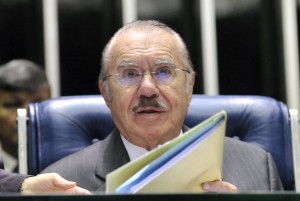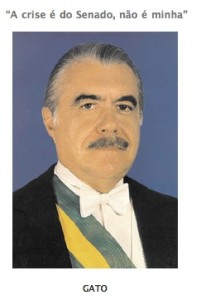Overnight, the #forasarney Twitter hashtag became one of the hottest on the social media network, making it to the trend topics on June 30th. At first glance, it seemed that the Internet was again being used as a potential political instrument for many people to voice their own opinions. Not only has the Twitter profile Fora Sarney [Get out, Sarney, pt] gained over 5,000 followers, but the newly created Fora Sarney [Get out, Sarney, pt] blog has already amassed 14,000 comments – through these tools, calls to march against the three times elected Senator José Sarney because of his nepotistic style have been made.
The Brazilian streets have gathered hundreds of people protesting in Brasília, São Paulo and Rio de Janeiro. In the capital, Brasília, an example of the fun poking and mockery of the politician can be seen in the video below, uploaded by thyede, where most people claim to have heard about the demonstration through blogs or Twitter, although only a small percentage of those protesting online showed up for the live action:
From Macapá, Alipio Júnior [pt] also reports that a protest took place in the northern Brazilian state that elected Sarney:
Cerca de 200 pessoas foram as ruas para pedir o afastamento de José Sarney da presidência do senado na capital do Amapá. Tudo foi organizado via internet através de blogs e pelo Twitter, movimento que também sensibilizou pessoas de outras cidades importantes como Rio de Janeiro, São Paulo e Brasília. Um carro de som estava a disposição dos cidadãos revoltados e envergonhados com a atitude do senador Maranhense mas eleito pelo Amapá.
However, nepotism is not a novelty in Sarney's political history – he is well known for keeping power within his family and employing relatives or staff from the family under the Senate’s payroll. The fact that has raised much other discussion on the blogosphere is why only now people have started to demand that Jose Sarney (PMDB) step down as the Brazilian Senate’s President. As the Dona Farta [pt] blog points out, the unlikely and surprising element in the mobilization is that, even though Sarney has been accused of many wrong doings over the years, it is only now that people have realized he is not a politician to be trusted:
(…) Porque tá rolando essa mobilização toda aí, né, por conta do Sarney, e coisa e tal. Todo mundo gritando “Fora, Sarney”, todo mundo querendo queimar o velho em praça pública, como se tivessem descoberto assim, do dia pra noite, que, “Oh, meu Deus, ele não presta!”
(…)
O que eu disse lá no Twitter, que provocou todo o mimimi, foi que eu estava (como de fato estou) de saco bem cheio desse carnaval “Fora Sarney”. E que as pessoas deviam lembrar de dizer FORA para qualquer político na hora de elegê-los, naquele processo democrático pelo qual passamos periodicamente chamado ELEIÇÕES.
[…]
What I said on Twitter, which has provoked all these complaints, is that I have had enough of this “Get out, Sarney” carnival. What people should remember is to say “GET OUT” to any politician at election time, in the democratic process that we go through from time to time and we call ELECTIONS.

Scared, Senator José Sarney has said that he is not leaving and nobody is going to oust him from the Senate Presidency. Photo: Geraldo Magela/Agência Senado
Although supporting the point of view above that most people protest but only know very little about underling issues, the memecarbono [pt] blog says that the protest is worthwhile. The blog also recalls Sarney's other recent wrong doings.
Mas…
Porque fora Sarney?
A maioria não sabe e repete simplesmente porque é o que todos, embalados por @rafinhabastos, estão repetindo desde o dia 16/07/2009 e pensam que é pelas recentes denúncias envolvendo o senador José Sarney, mas há razões mais antigas para a escolha deste político para um dos primeiros gritos por um governo limpo.
O primeiro movimento “Fora Sarney” foi em 2006 quando ele utilizou a justiça para tirar do ar o blog da jornalista Alcineia que o criticava. A propósito, agora Alcinea Cavalcante mantém seu blog no Blogger.
Desde então o atual senador faz parte do imaginário do Internauta cidadão como um símbolo do cerceamento da liberdade de expressão.Vários cidadãos mais atentos tem observado como o @inagaki que essa “mobilização” está para o exercício da cidadania na mesma proporção dos álbuns de Vanilla Ice para o hip hop.”
Why ‘Get out Sarney'?
Most people don’t know and simply follow what everyone else, headed by @rafinhabastos, has been saying repeatedly since 16/07/2009 [editor's note: the correct date seems to be 16/06/2009] and they think that it is because of the recent accusations against Senator José Sarney, there is however an older agenda for people singling Sarney out in this demand for a clean government.
The first “Get out Sarney” movement was in 2006 when he made use of the Justice system to shut down journalist Alcineia's blog [pt] who had been criticizing him. By the way, she maintains her blog in Blogger nowadays. Since then, the current Senator has become part of the netcitizen's imagination as a symbol of the restriction of freedom of speech.
Many more diligent citizens like @inagaki have noticed that “what this mob means for civic exercise is the same as that of Vanilla Ice records for hip hop”.
On Fora Sarney blog [pt], it is possible to get a flavour of Sarney’s biography:
Ex-presidente da República e atual senador pelo Amapá (onde raramente põe os pés, registre-se), Sarney representa o que mais de atrasado e deletério existe na política brasileira. Construiu sua carreira pública sempre aninhado ao lado das forças mais reacionárias da sociedade.
Começou embalado nos braços da extinta e golpista UDN (União Democrática Nacional), aconchegou-se no colo arbitrário da ARENA (Aliança Renovadora Nacional) – tentáculo civil da ditadura militar, a quem ingratamente abandonou quando os ventos mudaram de lado. Carreirista exemplar, foi bafejado com a sorte dos oportunistas e alçou-se à Presidência da República com a morte de Tancredo Neves, de quem era vice na chapa eleita pelo Colégio Eleitoral em1985.
Os feitos mais relevantes do seu mandato foram afundar a economia numa inflação estratosférica (80% ao mês, quando deixou o poder) e popularizar o uso de jaquetões e tinturas capilares em tons cajus.
À sombra reconfortante e providencial da atividade política, o prócer maranhense construiu um sólido patrimônio pessoal, formado, entre outros bens, por inúmeras fazendas e uma poderosa rede de comunicação (jornais, emissoras de rádio e televisão), obtida por meio de concessões do governo, que garante a influência e a eternização do clã Sarney no cenário político maranhense.
He started cradled in the arms of the coupist and now defunct [ally of the dictatorship] UDN Party (National Democratic Union), made himself comfortable in ARENA‘s arbitrary embrace – that is the National Renewal Alliance Party the civil arm of the military dictatorship that he ungratefully left behind when the political situation changed. An exemplar careerist, he was blessed with an opportunist's luck and reached the Country's Presidency with the death of Tancredo Neves, to whom Sarney was vice-president in an alliance elected by the Electoral College in 1985.
The most relevant achievements during his term were to shrink the economy to bleak inflation (by 80% per month, when he left office) and to make fashionable big blazers and dying hair in cashew nut shades.
Shadowed by comforting and convenient political activity, the Maranhão‘s chief has built up a huge personal property portfolio, having, among other assets, a number of farms and a powerful broadcast network company (including newspapers, radio and TV), acquired through government's broadcast license, which guarantees the Sarney clan a lifelong influence over the political scene of Maranhão.
What if Sarney steps down?
Right now, as in the past, the accusation against Sarney is nepotism: he has employed numerous members of his family in many public jobs in the Congress. For decades the same family has governed Maranhão, one of the most culturally wealthy and beautiful of the Brazilian states, but also one of the most miserable in the nation. According to Mello [pt], it is a place “where nepotism and self-exaltation reign shamelessly”. He believes the political moment should be analyzed a little bit more deeply, to show that there is only one reason why only now there is pressure against Sarney:
Já fiz duas postagens aqui sobre a intensa pressão em cima do senador José Sarney (que só Deus e a justiça amapaense sabem como conseguiu se reeleger batendo a valente Cristina Almeida (PSB)…). Nas duas, perguntava: coincidência ou Serra? E recebi vários questionamentos, como se eu estivesse defendendo Sarney e não, ao contrário – e era o foco das postagens – denunciando a utilização de antigas e manjadíssimas acusações contra o ex-presidente, logo agora que ele foi escolhido presidente do Senado, é aliado de Lula e inimigo declarado do presidente eleito pela mídia José Serra. Daí a pergunta: coincidência ou Serra?
Porque acusações contra o senador Sarney vêm do tempo em que ele ainda nem usava bigodes. Quem procurar na caixa de pesquisas aqui do blog vai encontrá-las aos montões.(…)
Because accusations against Senator Sarney date back to the times in which he didn't even have a moustache. Those who look for them here in the blog's search box will find a lot of accusations against him. […]
The criticism against Sarney can be followed on many blogs such as Nova Corja [pt] in which the official picture of Sarney as the President has been given a caption claiming he had nothing to do with the Senate crisis, one of the statements José Sarney used in his defense when one crisis broke out after another in the House:

In quotes: "The crisis is the Senate's one, it is not mine" And underneath: "Handsome". Official picture of 31st Brazilian President José Sarney. Agência Senado/modified by Nova Corja
Não é preciso escrever nada sobre o papelão que José Sarney (PMDB/AP-MA) faz como presidente do Senado. Mas sempre teremos sua galhardia literária para entreter os imortais na Academia Brasileira de Letras.
Posted by the Nova Corja blog and Fora Sarney website, below is a video made by Glauber Rocha showing the poverty of the Maranhão state. The voice over is of a Sarney speech, when he took up local government office in 1966.
Nevertheless, in a post entitled the Weimar Republic, Oleo do Diabo [pt] discusses what would happen if Sarney leaves his position in the Senate nowadays, analyzing the current political scenario:
O que está em jogo, afinal, não é o destino de Sarney, mas a cadeira de presidente do Senado num momento em que a oposição, com apoio obstinado e histérico da mídia, se prepara para iniciar a CPI da Petrobrás. A mídia está louca para trocar Sarney por outro menos comprometido com a governabilidade. Fale-se o que quiser de Sarney, mas ele tem prestado um importante apoio ao presidente Lula.
O Senado é o calcanhar de aquiles do governo Lula. É onde a oposição é mais forte. Por isso, a mídia se ocupa tanto do Senado, porque sabe que é ali que pode surgir um ataque efetivo ao presidente Lula. O Senado pode votar um pedido de impeachment. Pode atrasar indefinidamente a liberação de um orçamento. Pode destruir, através de uma CPI bem orientada, a reputação de uma candidata…
The Senate is the Achilles’ heel of the Lula government. It is the place where the opposition is strongest. Therefore, the media invest so much time reporting on the Senate, because they know that an effective attack against President Lula can break out there. The Senate can vote a request for [the president's] impeachment, it can delay the liberation of public budgets indefinitely. It can undermine the reputation of a [presidential] candidate too, using a well-guided parliamentary investigation…
Not as popular at the moment as #ForaSarney, here is also the hashtag and blog #ficasarney [Don't go, Sarney, pt]. These have been popularized by those who think there is no better alternative than Sarney at the moment. If he steps down, the Senator to take over his place is the opposition PSDB Senator Marconi Perillo, accused of irregularities in the 2006 elections. If this happens, President Lula might be in a lot of trouble when the time comes for the Senate to vote and decide provisory measures and other decisions involving legislative and executive power. Nevertheless, it seems that the Senate is always going to be in the news headlines and debates on the blogosphere, now that they have voted for the redistribution of land in the Amazon forest (to be signed or vetoed by Lula) and they are about to investigate the national oil giant Petrobras.










6 comments
Really interesting article. I had not been following this story online so very interesting to get this balanced perspective. In your quotation from the memecarbono blog you say “since 16/07/2009”, which I presume must be a mistake as today is 11/07/2009.
That’s true Sarah. I ‘ve just realized it. But, as we can se on the original post, they write exactly like that:16/07/09. I believe they wanted to mean 6th of July instead.